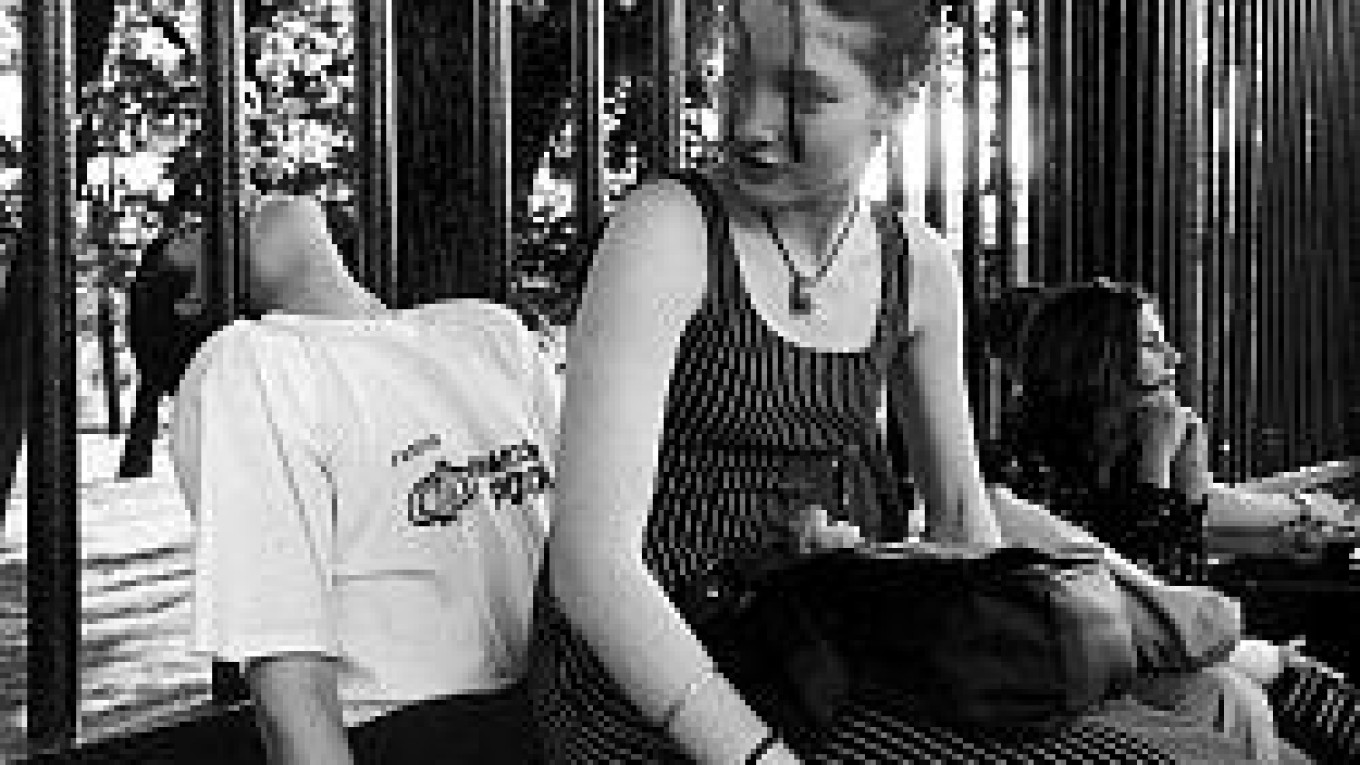This image from 1988 is among the earliest of nearly 200 photographs in "Born in the U.S.S.R.," the latest book from photographer Igor Mukhin and the first of his books to be published in Russia. Mukhin, 43, is quite possibly Russia's best known living photographer. His works can be found in places such as New York's Museum of Modern Art and Moscow's Tretyakov Gallery, and up until "Born in the U.S.S.R," his photography albums had been published only in Western cities such as Paris and Rome.
Mukhin first made his name in the late 1980s. As part of Immediate Photography, an underground grouping that included Boris Mikhailov and Alexander Slyusarev, he documented the crumbling remains of Soviet monumental propaganda. Soon, however, he went on to find his own individual style. Rejecting the social criticism of dissident art, he began to strike a more optimistic note, focusing his lens on the day-to-day lives of Russian youth.
This theme is on ample display in "Born in the U.S.S.R." The teens and twentysomethings who populate Mukhin's photographs are a lively bunch -- they swim, sunbathe, arm-wrestle, hug their boyfriends awkwardly in the street, wave banners at various kinds of political demonstrations, gaze at the fireworks on New Year's Eve and stick their tongues out at the camera.
During a recent telephone interview, Mukhin reflected on discovering his artistic niche. In the mid-1990s, he recalled, many of the West's top photographers came to Russia to document the war in Chechnya. "They all showed suffering," he said. "So that market was full. I didn't want to do that. I wanted to show another Russia, a peaceful one."
The result was "People in Love," a 1996 series that showed couples kissing and embracing in Moscow's public places. The acclaimed series, which consciously evoked Robert Doisneau's iconic pictures of Parisian lovers in the 1950s, was distinctly positive in tone -- and yet in its own way, it carried a resolutely antiwar message.
Politics has a way of creeping into Mukhin's photographs, although it is rarely front and center. In one witty composition from "Born in the U.S.S.R.," taken in 2005, a portrait of President Vladimir Putin is rolled out for a parade in central Moscow, partially blocking a sign for Bank Menatep -- a financial institution linked to Mikhail Khodorkovsky, the jailed former CEO of the Yukos oil company and a prominent Putin critic.
Other photographs in Mukhin's book feature young people at demonstrations. Some wear the armbands of the militant National Bolshevik Party, some drape themselves in antiwar placards, and one smiling man wears a Josef Stalin T-shirt. But Mukhin seems less concerned with political statements and more concerned with the faces of the young people involved. Like his shaggy-haired rock fans from the perestroika era or his adolescent boys and girls clumsily discovering their own sexuality, his demonstrators are simply searching for a new identity.
When asked about his book's title, Mukhin admitted that "Born in the U.S.S.R." was partially an attempt to capitalize on the current fashion for all things Soviet. But, he added, it was also the sole unifying thread that described all the heroes of his pictures, from vacationers in the Crimea to sailors in Vladivostok. The generation featured in his book is linked by its Soviet background, whether people admit it or not, he said.
"I recently went to Africa as a tourist," he recalled. "And when we were filling out the arrival forms, everybody was afraid to say that they had been born in the U.S.S.R. They said that they had born in Russia. But that's not really true."
The generational divide cuts through Mukhin's own family. The photographer said his daughter was born in 1991, so her passport will say she was born in the Soviet Union, unlike her younger brother, born in 2000. "Half her grade was born in Russia, and half was born in the U.S.S.R.," Mukhin said.
It is the latter half, of course, that has been the focus of Mukhin's work for the past two decades. And "Born in the U.S.S.R." offers a sweeping look at the generation that straddled communism and capitalism while it was busy growing up. Like Robert Frank's "The Americans," the landmark 1958 photography album that captured the United States on the verge of the civil rights movement, Mukhin's book documents an era of profound change.
It's a destiny that two punk girls walking down a Moscow alleyway in 1988 could scarcely have imagined.
"Born in the U.S.S.R." (Rozhdyonniye v SSSR) is published by Leonid Gusev.
A Message from The Moscow Times:
Dear readers,
We are facing unprecedented challenges. Russia's Prosecutor General's Office has designated The Moscow Times as an "undesirable" organization, criminalizing our work and putting our staff at risk of prosecution. This follows our earlier unjust labeling as a "foreign agent."
These actions are direct attempts to silence independent journalism in Russia. The authorities claim our work "discredits the decisions of the Russian leadership." We see things differently: we strive to provide accurate, unbiased reporting on Russia.
We, the journalists of The Moscow Times, refuse to be silenced. But to continue our work, we need your help.
Your support, no matter how small, makes a world of difference. If you can, please support us monthly starting from just $2. It's quick to set up, and every contribution makes a significant impact.
By supporting The Moscow Times, you're defending open, independent journalism in the face of repression. Thank you for standing with us.
Remind me later.


